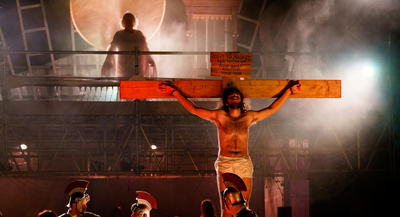About

The three Ordinalia plays are the oldest surviving trilogy of plays in Great Britain, comprising 'Creation of the World', the 'Passion of Christ', and the 'Resurrection of our Lord'. They were written by the clerics of Glasney College in Penryn, the best known and most important of Cornwall's religious institutions.
The Ordinalia plays are contemporary with the York and Wakefield cycle of Mystery plays, but they are a different genre with a different form of production. They were a trilogy of three separate plays designed to be performed by one community over a three day period. By contrast, the York and other Mystery plays are a cycle of 50 scenes, each designed to be performed by a separate craft -guild with its own interpretation and production methodology.
The Ordinalia plays were designed to be played in a round amphitheatre known as a Plen an Gwari (Playing Place) of which St Just has one of the two remaining operative ones. It is the oldest working amphitheatre in Great Britain.
The Ordinalia plays have three singular characteristics. Firstly, they not only present stories recorded in the Bible, but they also draw on apocryphal stories circulating at the time - such as the Harrowing of Hell, the Death of Pilate, and the Smith and the Nails.
Secondly, the original manuscript text includes 27 place-names in Cornwall, recording land-grants given to servants, mostly small hamlets near Penryn. In the Passion, the smith making the nails for Christ's cross is stated to work at Marazion, home to St Michael’s Mount, some 16 miles from Penryn!
And finally, the Ordinalia weaves the legend of the Holy Rood (see Student Resources area below) into the narrative, allowing each play to contain a number of interconnected stories. This motif does not play a significant part in other surviving English Mystery plays.
There are three surviving Ordinalia manuscripts - an original fifteenth century manuscript, held in the Bodleian Library Oxford, from which the other manuscripts appear to have been copied. A second text is in the Bodleian Library, and a third in the National Library of Wales.
In 1969 the Drama Department at Bristol University staged the Ordinalia plays for the first time in over 300 years at Perran Round in Perranporth - the other Cornish surviving Plen an Gwari.
In 2000, with a Millennium Festival grant, the St Just Ordinalia Company performed Origo Mundi.
In 2001, they performed The Passion, producing The Resurrection the following year.
In 2004, they uniquely performed the full cycle of Ordinalia plays.
Seventeen years later, in September 2021 the Cornish Ordinalia plays were again performed in St Just - on this occasion all three plays being performed in repertory, a unique and spectacular experience. Audiences of over 5000 people heard the Cornish Language being sung and spoken, as they witnessed this amazing medieval piece of theatre being brought to life.
We're now working towards performing the St Just Ordinalia every 5 years, and we are currently fundraising to perform the plays again in September 2026.
The Ordinalia plays are contemporary with the York and Wakefield cycle of Mystery plays, but they are a different genre with a different form of production. They were a trilogy of three separate plays designed to be performed by one community over a three day period. By contrast, the York and other Mystery plays are a cycle of 50 scenes, each designed to be performed by a separate craft -guild with its own interpretation and production methodology.
The Ordinalia plays were designed to be played in a round amphitheatre known as a Plen an Gwari (Playing Place) of which St Just has one of the two remaining operative ones. It is the oldest working amphitheatre in Great Britain.
The Ordinalia plays have three singular characteristics. Firstly, they not only present stories recorded in the Bible, but they also draw on apocryphal stories circulating at the time - such as the Harrowing of Hell, the Death of Pilate, and the Smith and the Nails.
Secondly, the original manuscript text includes 27 place-names in Cornwall, recording land-grants given to servants, mostly small hamlets near Penryn. In the Passion, the smith making the nails for Christ's cross is stated to work at Marazion, home to St Michael’s Mount, some 16 miles from Penryn!
And finally, the Ordinalia weaves the legend of the Holy Rood (see Student Resources area below) into the narrative, allowing each play to contain a number of interconnected stories. This motif does not play a significant part in other surviving English Mystery plays.
There are three surviving Ordinalia manuscripts - an original fifteenth century manuscript, held in the Bodleian Library Oxford, from which the other manuscripts appear to have been copied. A second text is in the Bodleian Library, and a third in the National Library of Wales.
In 1969 the Drama Department at Bristol University staged the Ordinalia plays for the first time in over 300 years at Perran Round in Perranporth - the other Cornish surviving Plen an Gwari.
In 2000, with a Millennium Festival grant, the St Just Ordinalia Company performed Origo Mundi.
In 2001, they performed The Passion, producing The Resurrection the following year.
In 2004, they uniquely performed the full cycle of Ordinalia plays.
Seventeen years later, in September 2021 the Cornish Ordinalia plays were again performed in St Just - on this occasion all three plays being performed in repertory, a unique and spectacular experience. Audiences of over 5000 people heard the Cornish Language being sung and spoken, as they witnessed this amazing medieval piece of theatre being brought to life.
We're now working towards performing the St Just Ordinalia every 5 years, and we are currently fundraising to perform the plays again in September 2026.
